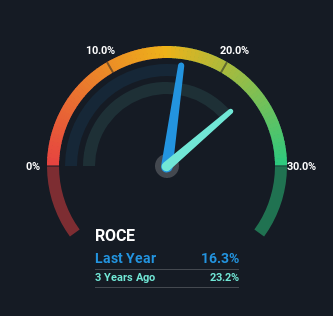- United States
- /
- Personal Products
- /
- NYSE:NUS
Returns On Capital Signal Tricky Times Ahead For Nu Skin Enterprises (NYSE:NUS)

If you're not sure where to start when looking for the next multi-bagger, there are a few key trends you should keep an eye out for. Amongst other things, we'll want to see two things; firstly, a growing return on capital employed (ROCE) and secondly, an expansion in the company's amount of capital employed. Put simply, these types of businesses are compounding machines, meaning they are continually reinvesting their earnings at ever-higher rates of return. Having said that, from a first glance at Nu Skin Enterprises (NYSE:NUS) we aren't jumping out of our chairs at how returns are trending, but let's have a deeper look.
What Is Return On Capital Employed (ROCE)?
For those who don't know, ROCE is a measure of a company's yearly pre-tax profit (its return), relative to the capital employed in the business. The formula for this calculation on Nu Skin Enterprises is:
Return on Capital Employed = Earnings Before Interest and Tax (EBIT) ÷ (Total Assets - Current Liabilities)
0.16 = US$248m ÷ (US$1.9b - US$384m) (Based on the trailing twelve months to June 2022).
Therefore, Nu Skin Enterprises has an ROCE of 16%. In absolute terms, that's a pretty normal return, and it's somewhat close to the Personal Products industry average of 17%.
Check out our latest analysis for Nu Skin Enterprises

In the above chart we have measured Nu Skin Enterprises' prior ROCE against its prior performance, but the future is arguably more important. If you'd like, you can check out the forecasts from the analysts covering Nu Skin Enterprises here for free.
So How Is Nu Skin Enterprises' ROCE Trending?
When we looked at the ROCE trend at Nu Skin Enterprises, we didn't gain much confidence. Around five years ago the returns on capital were 23%, but since then they've fallen to 16%. And considering revenue has dropped while employing more capital, we'd be cautious. This could mean that the business is losing its competitive advantage or market share, because while more money is being put into ventures, it's actually producing a lower return - "less bang for their buck" per se.
The Bottom Line
In summary, we're somewhat concerned by Nu Skin Enterprises' diminishing returns on increasing amounts of capital. It should come as no surprise then that the stock has fallen 31% over the last five years, so it looks like investors are recognizing these changes. That being the case, unless the underlying trends revert to a more positive trajectory, we'd consider looking elsewhere.
On a separate note, we've found 2 warning signs for Nu Skin Enterprises you'll probably want to know about.
While Nu Skin Enterprises may not currently earn the highest returns, we've compiled a list of companies that currently earn more than 25% return on equity. Check out this free list here.
If you're looking to trade Nu Skin Enterprises, open an account with the lowest-cost platform trusted by professionals, Interactive Brokers.
With clients in over 200 countries and territories, and access to 160 markets, IBKR lets you trade stocks, options, futures, forex, bonds and funds from a single integrated account.
Enjoy no hidden fees, no account minimums, and FX conversion rates as low as 0.03%, far better than what most brokers offer.
Sponsored ContentValuation is complex, but we're here to simplify it.
Discover if Nu Skin Enterprises might be undervalued or overvalued with our detailed analysis, featuring fair value estimates, potential risks, dividends, insider trades, and its financial condition.
Access Free AnalysisHave feedback on this article? Concerned about the content? Get in touch with us directly. Alternatively, email editorial-team (at) simplywallst.com.
This article by Simply Wall St is general in nature. We provide commentary based on historical data and analyst forecasts only using an unbiased methodology and our articles are not intended to be financial advice. It does not constitute a recommendation to buy or sell any stock, and does not take account of your objectives, or your financial situation. We aim to bring you long-term focused analysis driven by fundamental data. Note that our analysis may not factor in the latest price-sensitive company announcements or qualitative material. Simply Wall St has no position in any stocks mentioned.
About NYSE:NUS
Nu Skin Enterprises
Engages in the development and distribution of various beauty and wellness products worldwide.
Flawless balance sheet and good value.
Similar Companies
Market Insights
Community Narratives



